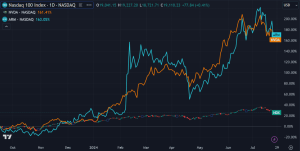Share this page:
Building a sustainable stream of passive income is a fantastic way to create long-term wealth. For many, life is just far too busy to engage in the traditional way of making extra income, trading time for money. Whether you are a busy professional looking to make some extra cash, or a full-time mum looking to invest for your children’s future, passive income might just be the perfect solution to meet your financial goals. This is how I’m building passive income for financial freedom in 2022:
Dividend stocks
One of my favourite ways of building passive income is through owning dividend stocks. Dividend stocks are simply shares in a company that pay a portion of their profits to their investors through dividends. I love this method because it is simple to set up and requires no ongoing maintenance until you decide to sell. Through these dividends, you get extra income on top of any capital gains, and if you’re really savvy, can reinvest your extra earnings to benefit from the magic of compound interest. You might even want to know more about our newsletter subscription service, Share Advisor, in which we make monthly recommendations of income stocks (as well as growth opportunities). Of course, remember investments always involve various risks, and you may get back less than you put in. There is a risk of losing the capital invested.
Cashback
Getting cashback on your everyday purchases is another fantastic passive income strategy I take advantage of. If you’re planning on buying something, why not get some extra cash for doing it? Websites like TopCashback and Quidco make it incredibly easy to get money back on things clothes, technology and household bills. In fact, Quidco members claim back a handy £300 per year on average!
Another popular way to claim cashback is through cashback credit cards. I love the American Express Platinum Cashback credit card, which offers 5% cashback on purchases on the first 3 months (capped at £125), and between 0.75% and 1.25% cashback thereafter, depending on how much you spend. For someone spending £500 per month, this means £108.75 yearly cashback.
Put the two together and that’s an extra £409 a year in your pocket, which is certainly worthwhile if you ask me!
Passive income apps
It may sound too good to be true, but some apps really pay you for doing very little. For example, if you don’t mind sharing your data Ipsos will pay you between £5 and £10 per month just to download their app. After that, just use your device as normal. It works by collecting data in the background which it sells to companies, and cuts you in. It’s all totally anonymous and no one knows it’s your data specifically.
Another app you’ll find on my phone is the Sweatcoin app, which will pay you just for walking: perfect if, like me, you prioritise your 10,000 steps per day. For every 1,000 steps, you will receive just under 1 sweatcoin, which can be exchanged for cool products at a time of your choosing. You can spend them quickly for small rewards or save up for more valuable items. Recent options include iPhones and PayPal vouchers; however, rewards are constantly changing so you’ll need to be quick once something catches your eye!
Was this article helpful?
YesNo
About the author
Share this page:
Some offers on The Motley Fool UK site are from our partners — it’s how we make money and keep this site going. But does that impact our ratings? Nope. Our commitment is to you. If a product isn’t any good, our rating will reflect that, or we won’t list it at all. Also, while we aim to feature the best products available, we do not review every product on the market. Learn more here. The statements above are The Motley Fool’s alone and have not been provided or endorsed by bank advertisers. John Mackey, CEO of Whole Foods Market, an Amazon subsidiary, is a member of The Motley Fool’s board of directors. The Motley Fool UK has recommended Barclays, Hargreaves Lansdown, HSBC Holdings, Lloyds Banking Group, Mastercard, and Tesco.
This post was originally published on Motley Fool







